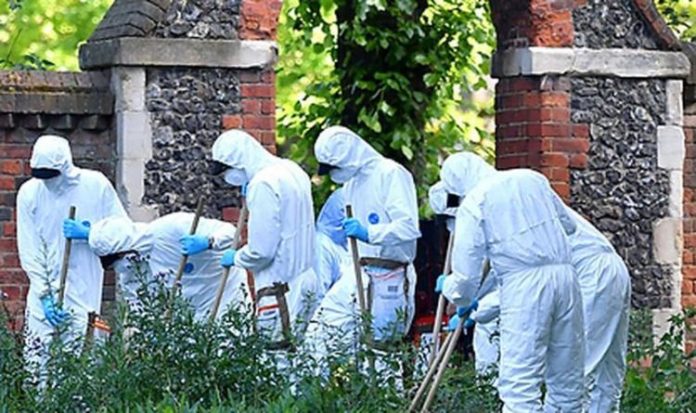Khairi Saadallah, 26, hacked to death James Furlong, David Wails and Joseph Ritchie-Bennett in a horrifying attack in a park. The Libyan refugee also lashed out at Stephen Young, Patrick Edwards and Nishit Nisudan, leaving them seriously injured. Crown lawyers say the stabbing spree in Forbury Gardens, Reading, in June was an act of terrorism.
Witnesses reported hearing him shout “Allahu Akbar” (God is greatest) during the attack.
But Saadallah claims he was not motivated by any “religious, political or ideological cause”.
Yesterday Alison Morgan QC, prosecuting, said Saadallah merited a “whole life” tariff when he is sentenced next month.
The killer, who lived close to the scene, had been due to go on trial at the Old Bailey on November 30.
But yesterday he pleaded guilty to three counts of murder and three of attempted murder.
He wore a red and white hat and grey jacket, his voice appeared muffled as he spoke through a face mask. Members of the victims’ families sat in court.
American citizen Mr Ritchie-Bennett’s relatives watched the proceedings via a video link from the US.
Mr Justice Sweeney said Saadallah denied substantial preparation or planning before the attacks. The court heard several issues needed to be argued at the sentencing hearing, including Saad- allah’s mental state.
The murder victims and one of the wounded were all friends.
Mr Furlong, 36, was a popular head of history at Holt School, Wokingham, near Reading, and described by his parents as “beautiful, intelligent, honest and fun”.
Mr Wails, 49, was a scientist at leading chemicals company Johnson Matthey. His parents said he was a “kind and much loved son who never hurt anyone”.
Mr Ritchie-Bennett, 39, of Philadelphia, Pennsylvania, was chief executive of the LGBT charity Reading Pride. His father Robert described his son as an “absolutely fabulous guy”.
They were in the park with their friend Stephen Young who survived.
Saadallah was on the radar of MI5 in 2019 over concerns he planned to travel abroad, possibly for terrorism purposes, but the threat was found to be “insubstantial”.
He had previously been jailed for crimes including racially aggravated assault, knife offences and criminal damage.
Saadallah claimed asylum in the UK in 2012 and won permission to stay in 2018.







